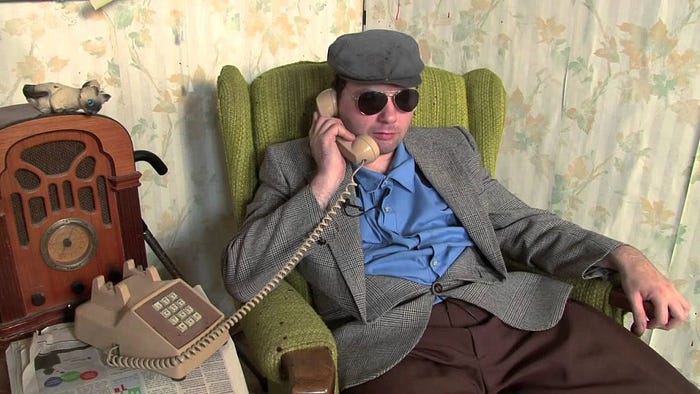Shut up, old man…

Often you will be part of meetings where people show demos of what your product could look like in the future. These are brain-storming, visionary meetings that can have great outcomes. The idea is to not think in boundaries but in benefits for your users and customers. The longer you work in a certain company and the higher you climb on the career ladder, the more of these meetings will be yours to attend and organise. I am currently a Principal Program Manager. This means my gaze should be a few years down the line. I’m expected to lead the company to a bright future and anticipate needs of future customers.
This is great. It is wonderful when your employer realises that your experience is an asset. Even better when the company expects your pace of work to slow down as you get older and you’re not supposed to “hustle” but reflect and guide instead.
But there is one problem.
Every inspirational, blue-sky, brainstorming meeting or demo session has a person that keeps disrupting the flow. A battle-hardened, highly experienced developer with lots of memories of how things failed in the past. A person who a lot of people look up to and whose input counts as important. The even bigger problem is that this grumpy old person lives inside my head.
When you’ve been working for a long time in a certain market you accumulated a lot of information. You learn things at first, you take some on as positive and discard others.
You see things fail, and you often don’t see any effort to analyse why they failed. Then you blame the part of the failed project you controlled — the technology. And this can lead to a bias where you discard anything remotely similar as failure in the making.
It is a problem when your knowledge and experience becomes a barrier. You know what worked in the past and of course this is the thing to do. All these newfangled things seem flaky and overly complex. They also expect users to embrace technology at a much faster pace than you remember them to do. Hot new interface ideas or content strategies feel like things you heard many times and never added up to any success.
It is important to understand that this is a destructive way of thinking. That’s why I keep telling the old man in my head to shut up and listen instead.
There are a few things that help me with that.
- We tend to see the past in extremes. We either remember good experiences as excellent or bad experiences as abysmal. We even block quite a few out and the longer in the past something was the more unreliable our feeling about it is.
- I’ve seen technology change over and over again. I’ve seen things succeed I considered pointless and things I was all for fail to win any public interest.
- I’ve often been part of experimental technologies that were too early in the process. Computers weren’t fast enough, people didn’t have the devices or connectivity needed. And just when I discarded them as a learning experience the market moved on and — with a few tweaks — they became a success.
- I’ve learned from failures. I accumulated some knowledge on the way and learned what not to do. Who am I to not allow younger colleagues to get the same insights?
- We live in a wasteful market. A huge part of our market is a series of short-term successes that fade into oblivion to be replaced by the next hyped product. This appears wasteful, but for years I realised it is not worth complaining about this. It is what it is — burning money is part of an ever growing economy. This can soon reach a tipping point, but that is not a reason to be stingy upfront. This isn’t only about money, it is also about code, work time and short-lived products. Some will fail, and that is OK. You can’t win it all.
It is tough to let go and start thinking in a “what if not everything is shit” way. It is fun though to plan ahead and describe a future product your users deserve. A product that focuses on outcome and functionality, unencumbered by your experiences. It is OK to dream without your experiences being a party pooper. A vision that inspires younger people to get creative and have their own experiences. It is their job to deliver this vision, after all. They will be a lot better at finding technical solutions that get them there than you would. As the solutions you cherish and love worked for you, but may not be as useful as you think they are now.
I’m happy to muzzle the grumpy old man in my head, and I hope that will prevent the people who work with me to ever meet him.
